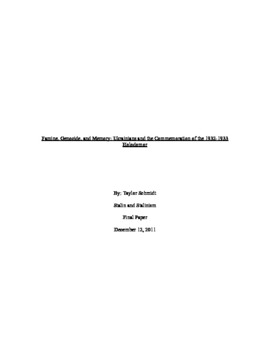| dc.contributor.author | Schmidt, Taylor | en_US |
| dc.contributor.editor | Blanchard, Tessa | en_US |
| dc.contributor.editor | Carter, Michael | en_US |
| dc.contributor.editor | Geary, Ryan | en_US |
| dc.contributor.editor | Renner, Scott | en_US |
| dc.contributor.editor | Riley, Meghan | en_US |
| dc.date.accessioned | 2016-11-15T21:56:30Z | |
| dc.date.accessioned | 2021-04-14T15:12:40Z | |
| dc.date.available | 2016-11-15T21:56:30Z | |
| dc.date.available | 2021-04-14T15:12:40Z | |
| dc.date.issued | 2012-10-01 | en_US |
| dc.identifier.uri | https://hdl.handle.net/11244.46/1235 | |
| dc.description | Runner-up for the Griswold Prize for Excellence in Undergraduate Historical Scholarship | en_US |
| dc.description.abstract | History is political. Never has this been truer than in the former Soviet Union, where the past was subject to incessant ‘revisions.’ Mr. Schmidt takes on the Ukrainian famine, or Holodomor, from an international perspective, and does so quite thoroughly. As the paper unfolds, the reader comes to realize how inextricably entwined Ukranian identity is with this event. Genocide perpetrated on Ukranian people, or unintended pan-Soviet tragedy, the Holodomor’s political implications reach across oceans. The paper distinguishes itself with its in depth research and the author’s acute sensitivity to the gravity of the topic he so brilliantly explores. - Ryan Geary | en_US |
| dc.description.uri | http://history.ou.edu/journal | en_US |
| dc.relation.ispartofseries | OU historical journal ; 1 (Fall 2012) | en_US |
| dc.title | Famine, Genocide, and Memory: Ukrainians and the Commemoration of the 1932-1933 Holodomor | en_US |
| dc.contributor.sponsor | Folsom, Raphael | en_US |
| dc.contributor.sponsor | Holguín, Sandie | en_US |
| dc.contributor.sponsor | Levenson, Alan | en_US |
| dc.description.undergraduate | undergraduate | |
